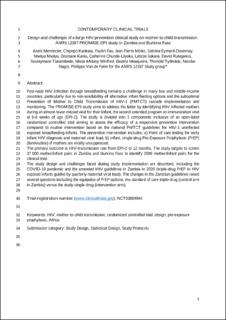| dc.contributor.author | Mennecier, Anaïs | |
| dc.contributor.author | Kankasa, Chipepo | |
| dc.contributor.author | Fao, Paulin | |
| dc.contributor.author | Molès, Jean-Pierre | |
| dc.contributor.author | Eymard-Duvernay, Sabrina | |
| dc.contributor.author | Mwiya, Mwiya | |
| dc.contributor.author | Kania, Dramane | |
| dc.contributor.author | Chunda-Liyoka, Catherine | |
| dc.contributor.author | Sakana, Leticia | |
| dc.contributor.author | Rutagwera, David | |
| dc.contributor.author | Tassembedo, Souleymane | |
| dc.contributor.author | Wilfred-Tonga, Maria Melany | |
| dc.contributor.author | Mosqueira, Beatriz | |
| dc.contributor.author | Tylleskär, Thorkild | |
| dc.contributor.author | Nagot, Nicolas | |
| dc.contributor.author | Van De Perre, Philippe | |
| dc.date.accessioned | 2022-04-04T11:54:26Z | |
| dc.date.available | 2022-04-04T11:54:26Z | |
| dc.date.created | 2022-01-21T09:19:08Z | |
| dc.date.issued | 2021 | |
| dc.identifier.issn | 1551-7144 | |
| dc.identifier.uri | https://hdl.handle.net/11250/2989608 | |
| dc.description.abstract | Post-natal HIV infection through breastfeeding remains a challenge in many low and middle-income countries, particularly due to non-availability of alternative infant feeding options and the suboptimal Prevention of Mother to Child Transmission of HIV-1 (PMTCT) cascade implementation and monitoring. The PROMISE-EPI study aims to address the latter by identifying HIV infected mothers during an almost never-missed visit for their infant, the second extended program on immunization visit at 6–8 weeks of age (EPI-2). The study is divided into 3 components inclusive of an open-label randomized controlled trial aiming to assess the efficacy of a responsive preventive intervention compared to routine intervention based on the national PMTCT guidelines for HIV-1 uninfected exposed breastfeeding infants. The preventive intervention includes: a) Point of care testing for early infant HIV diagnosis and maternal viral load; b) infant, single-drug Pre-Exposure Prophylaxis (PrEP) (lamivudine) if mothers are virally unsuppressed.
The primary outcome is HIV-transmission rate from EPI-2 to 12 months. The study targets to screen 37,000 mother/infant pairs in Zambia and Burkina Faso to identify 2000 mother/infant pairs for the clinical trial.
The study design and challenges faced during study implementation are described, including the COVID-19 pandemic and the amended HIV guidelines in Zambia in 2020 (triple-drug PrEP in HIV exposed infants guided by quarterly maternal viral load). The changes in the Zambian guidelines raised several questions including the equipoise of PrEP options, the standard of care-triple-drug (control arm in Zambia) versus the study-single-drug (intervention arm). | en_US |
| dc.language.iso | eng | en_US |
| dc.publisher | Elsevier | en_US |
| dc.rights | Attribution-NonCommercial-NoDerivatives 4.0 Internasjonal | * |
| dc.rights.uri | http://creativecommons.org/licenses/by-nc-nd/4.0/deed.no | * |
| dc.title | Design and challenges of a large HIV prevention clinical study on mother-to-child transmission: ANRS 12397 PROMISE-EPI study in Zambia and Burkina Faso | en_US |
| dc.type | Journal article | en_US |
| dc.type | Peer reviewed | en_US |
| dc.description.version | acceptedVersion | en_US |
| dc.rights.holder | Copyright 2021 Elsevier | en_US |
| dc.source.articlenumber | 106402 | en_US |
| cristin.ispublished | true | |
| cristin.fulltext | postprint | |
| cristin.qualitycode | 1 | |
| dc.identifier.doi | 10.1016/j.cct.2021.106402 | |
| dc.identifier.cristin | 1987088 | |
| dc.source.journal | Contemporary Clinical Trials | en_US |
| dc.identifier.citation | Contemporary Clinical Trials. 2021, 105. 106402. | en_US |
| dc.source.volume | 105 | en_US |

